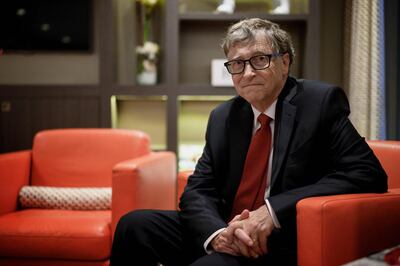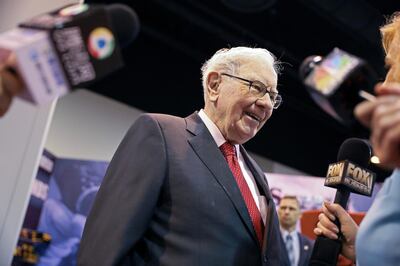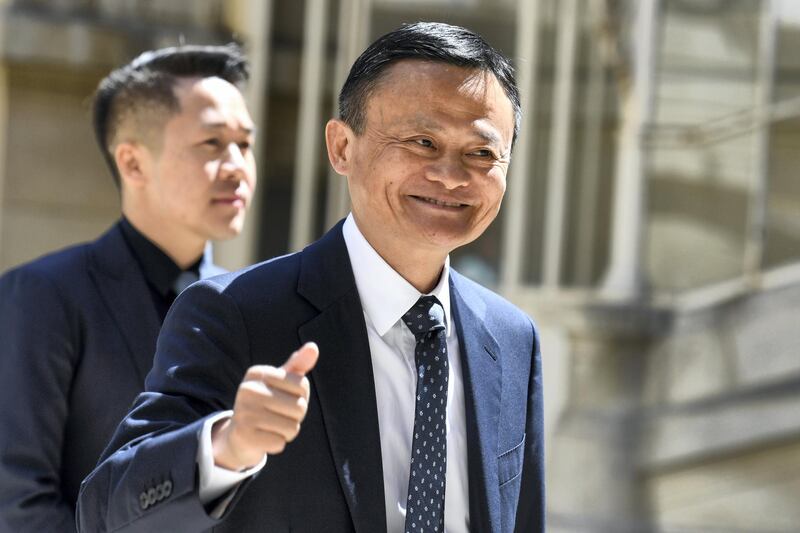Alibaba co-founder Jack Ma pledged to donate 1.8 million face masks and 210,000 coronavirus test kits to some of Asia's poorest nations, which have seen a rise in Covid-19 cases.
On Twitter on Saturday, Mr Ma said Afghanistan, Bangladesh, Cambodia, Laos, Maldives, Mongolia, Myanmar, Nepal, Pakistan and Sri Lanka would receive face masks and test kits, as well as protective suits, ventilators and thermometers to assist their fight against the virus.
The announcement follows another tweet on Monday, in which Mr Ma pledged to donate more than a million coronavirus testing kits to Africa, as more African nations reported their first cases of the disease. At least 30 countries now have confirmed cases.
“We cannot ignore the potential risk to Africa and assume this continent of 1.3 billion people will blissfully escape the crisis. The world cannot afford the unthinkable consequences of a Covid-19 pandemic in Africa," Mr Ma's private foundation said in a statement.
The foundation will send 1.1 million testing kits, six million masks and 60,000 protective suits and face shields to Ethiopia for distribution to Africa’s 54 nations, it said.
Last week, the Jack Ma Foundation and the Alibaba Foundation announced they have prepared 500,000 testing kits and a million masks to be sent to the US, adding to those already donated to other affected countries including Japan, South Korea, Italy, Iran and Spain.
After joining Twitter, Mr Ma posted for the first time on Monday with photos of a China Eastern Airlines plane with boxes of the test kits and face masks slated to be shipped and donated to the US. “All the best to our friends in America,” he wrote in the tweet.
Mr Ma had previously announced on his Weibo account that he would donate 100 million yuan (Dh51.6m) through his foundation to support medical research efforts and disease prevention.
Mr Ma reclaimed the title of Asia’s richest man this month, after the collapse of oil prices and global stocks left Indian energy tycoon Mukesh Ambani $5.8 billion (Dh21.3bn) poorer. Mr Ma has a current net worth of $41bn, according to the Bloomberg Billionaires Index, about $4.7bn more than Mr Ambani.

Bill Gates
Bill Gates said he is stepping down from the board of Microsoft, the company he co-founded in 1975 and built into the world’s largest software maker, to devote more time to philanthropy.
Mr Gates, 64, has been scaling back his involvement in the company for more than a decade. Most recently he had been serving as an adviser to chief executive Satya Nadella on technology areas including productivity, health software and artificial intelligence, and he will continue to do so.
“Microsoft will always be an important part of my life’s work and I will continue to be engaged with Satya and the technical leadership to help shape the vision and achieve the company’s ambitious goals,” Mr Gates wrote in a blog post on March 13. “I feel more optimistic than ever about the progress the company is making and how it can continue to benefit the world.”
Mr Gates has not been active in a day-to-day role since 2008, Microsoft said. That is when he switched to devoting the majority of his time to the Bill & Melinda Gates Foundation. The billionaire now wants to spend more time working on global health, education and tackling climate change. He served as chief executive of Microsoft until 2000, the same year his foundation was started, and was chairman of the company until February 2014.
Mr Gates will also exit the board of Berkshire Hathaway, the company run by his longtime friend Warren Buffett. Mr Gates joined Berkshire’s board in late 2004 and the pair deepened their ties in 2006, when Mr Buffett said he would plan to give away the bulk of his fortune to charitable groups including the Gates Foundation. Both Mr Buffett and Mr Gates have continued to push for more philanthropic efforts among the wealthiest, with initiatives such as “The Giving Pledge”.
Last month, the Gates Foundation committed $100m to the global Covid-19 response. Mr Gates is the world’s second richest person with a current net worth of around $92bn, according to the Bloomberg Billionaires Index.

Warren Buffett
Warren Buffett has barred shareholders from attending Berkshire Hathaway’s annual meeting in May amid growing fears about the spread of the coronavirus.
The meeting, which generally draws thousands to his home town of Omaha, Nebraska, will still be held, but attendance will be limited to Mr Buffett, possibly his business partner Charlie Munger and several Berkshire employees who will deliver proxy votes, Berkshire said on March 13. The meeting will be streamed by Yahoo.
"I very much regret this action," Mr Buffett said. "For many decades the annual meeting has been a high point of the year for me and my partner, Charlie Munger."
Berkshire’s annual meeting floods the city with shareholders and employees, many of whom spend hours on a Saturday listening to Mr Buffett and Mr Munger speak. The company had warned earlier in March that while the meeting, scheduled for May 2, would still happen, the scope of the event could change.
“It is now clear, however, that large gatherings can pose a health threat to the participants and the greater community,” Mr Buffett said. “We won’t ask this of our employees and we won’t expose Omaha to the possibility of becoming a ‘hot spot’ in the current pandemic.”
Mr Buffett encouraged investors to send questions to select journalists, who then will ask Mr Buffett and Mr Munger about the topics – though he said he is deferring a decision on whether one or more of those journalists will be present at the meeting.
Covid-19 is particularly risky for the elderly and those with serious underlying health issues. Mr Buffett is 89 and Mr Munger turned 96 this year.
Ray Dalio
Billionaire investor Ray Dalio, whose main Bridgewater Associates hedge fund fell sharply amid the coronavirus-led market rout, is concerned about the combination of zero interest rate policy and the growing health pandemic, he said Monday.
"I have been concerned that when the economic downturn would come, it would lead to hitting the 0 per cent interest rate in an economic downturn with a lot of debt outstanding and big wealth and political gaps the way that configuration of events happened [in] the 1930s," Mr Dalio said.
"The coronavirus was the thing to cause the downturn, which surprised me. While it is an extremely serious infectious disease and that will produce many harmful economic impacts, these things alone do not scare me; however, when combined with long-term interest rates hitting the hard 0 per cent floor, that really worries me."
On Sunday, the US Federal Reserve cut interest rates to a target range of 0 per cent to 0.25 per cent, its second emergency reduction in less than two weeks to help shore up the US economy.
Bridgewater, the world's biggest hedge fund manager in large part because of its reputation for predicting macroeconomic moves, was caught off guard by market turmoil over the first half of March. It has lost as much as 21 per cent this year across the firm’s strategies.
"We did not know how to navigate the virus and chose not to because we didn't think we had an edge in trading it. So, we stayed in our positions and in retrospect we should have cut all risk," Mr Dalio said to the Financial Times on March 14.
In the note, Mr Dalio wrote that long-term interest rates hitting zero means that "virtually all asset classes go down" because there is little more central banks can do.
Mr Dalio added that printing money and buying debt assets by the Fed and others "almost certainly will not work much" and that real interest rates will likely rise because of deflation from lower oil and other commodity prices, economic weakness and more credit problems.







